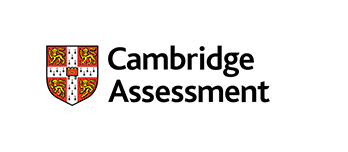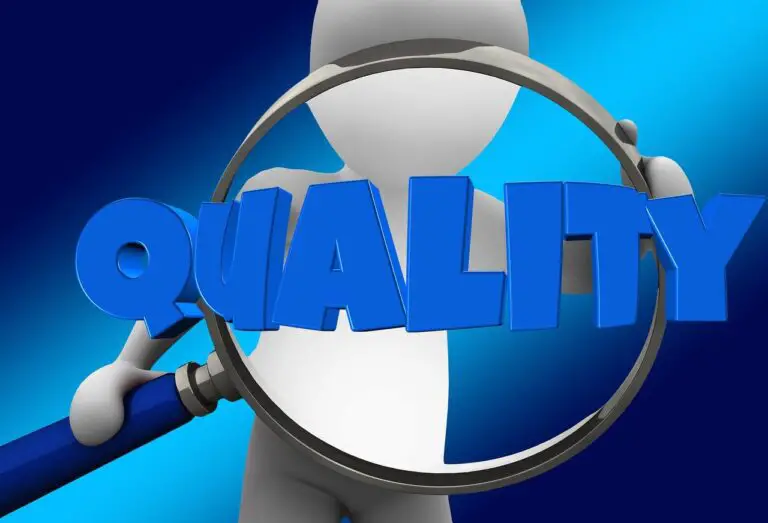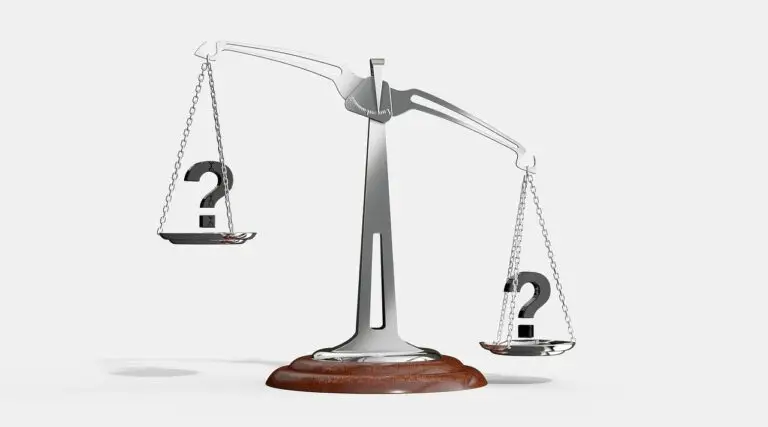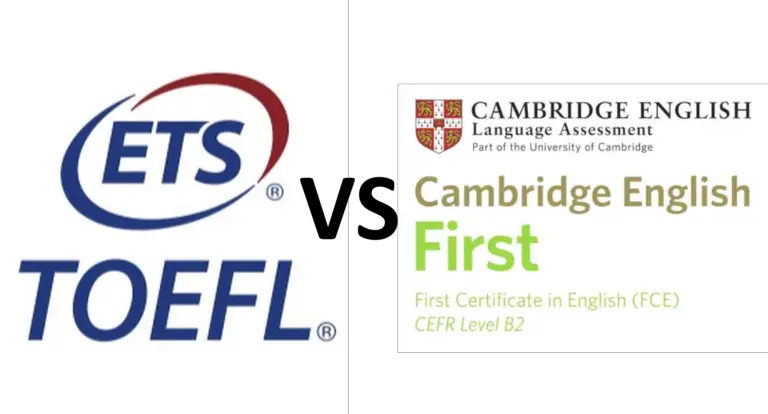The B2 First (formerly known as FCE) and IELTS are two of the most important English proficiency exams in the world. But did you know they’re both connected to the same exam company, Cambridge Assessment?

So why have two different exams? What’s the difference between them, and why would you choose one over the other? In this article, I’ll answer all your questions.
The table below shows you the key differences. But don’t skip the rest of the article, as I’ll go over the finer details and suggest which exam is best for you (or, if you’re an EFL/ESL teacher, for your students).
| B2 First (FCE) | IELTS | |
|---|---|---|
| Exam company | Cambridge Assessment | Collaboration: Cambridge Assessment, British Council, IELTS USA and IDP: IELTS Australia |
| Scoring method | 60% mark for B2 certification | Overall mark gives you level (1-9) |
| Exam papers | 4 – Writing, Listening, Speaking and Reading & Use of English | 4 – Writing, Listening, Speaking and Reading |
| Exam duration | 3 hours 30 minutes approx. | 2 hours 45 minutes |
| Expiration date | Never expires | Valid for 2 years |
| Cost | $150-300 | $140-310 |
| Required for | Employment, University entrance | UK Higher Education, Immigration, Employment |
What are the B2 First and IELTS?
Both the B2 First and IELTS are English proficiency exams taken by non-native English speakers to prove they have a certain understanding of and ability with the English language.
The B2 First certificate (formerly known as FCE) is a qualification for B2 level (upper intermediate) English.
The IELTS (International English Language Testing System) is a similar exam that is for English learners of all levels.
Who provides the B2 First and IELTS qualifications?
Both the B2 First and IELTS are provided by extremely reputable international organisations.
The IELTS is run by a collaboration of institutions in the UK, USA and Australia. These are Cambridge Assessment, the British Council, IELTS USA and IDP: IELTS Australia.
Cambridge University Press and Assessment (as they have been known since 2021) have been in the English exam industry for over a century, with their first test coming out in 1913. They’re also major providers of textbooks and learning resources globally.

And the B2 First is one of Cambridge Assessment’s suite of own brand exams. The B2 First is joined by other exams, like the B1 Preliminary and C1 Advanced, making up the “Cambridge English” exams.
How are the B2 First and IELTS exams scored?
The scoring systems in the B2 First and IELTS are very different.
The B2 First is for students who are aiming to get a qualification saying they have a B2 level of English. B2 is Upper Intermediate on the CEFR scale. The CEFR is the most popular system around the world for ranking English proficiency, and ranges from A1 to C2.
Candidates need to get 60% in their global score to pass. If they fail, they don’t receive an official certificate of any level (although they will indicate if you reached a level equivalent to B1).

The IELTS, on the other hand, can be taken by students of any level. The mark you get reflects the level of English you showed in the exam, and is scored from 1 to 9. For reference, a 6 in IELTS is equivalent to a B2 on the CEFR scale.
The effect of the IELTS being scored in this way is that questions range in difficulty. In contrast, the B2 First has questions which are all suited for candidates at the upper intermediate level.
What are the different parts of the B2 First and IELTS exams?
The B2 First and IELTS look very similar in terms of the papers you have to do.
The B2 First has:
- Writing
- Listening
- Speaking
- Reading & Use of English
Meanwhile, the IELTS has:
- Writing
- Listening
- Speaking
- Reading
So it seems the only difference is that the B2 First has Use of English combined with the Reading. Use of English is essentially a nice way of saying “grammar and vocab”. It’s also one of the most notoriously difficult parts of Cambridge exams.
But there are more differences when you look a little deeper.
For a start, the B2 First Writing section offers some choice of topic, so you can avoid ones you’re less familiar. In the IELTS, you must write about the topic they give you.

Another major difference is that in the B2 First Listening paper, you get to listen to the audio twice, whereas in the IELTS, it’s just once.
The speaking tests don’t have much in common either. Those taking the B2 First perform the speaking test with a partner, and there’s an emphasis on interaction and communication. IELTS candidates do the speaking test alone.
How long do the B2 First and IELTS exams take?
The B2 First takes 45 minutes longer than the IELTS. Here’s a table showing the differences by part.
| B2 First | IELTS | |
|---|---|---|
| Writing | 80 minutes | 60 minutes |
| Listening | 40 minutes (approx.) | 30 minutes |
| Speaking | 14 minutes | 11-14 minutes |
| Reading (& Use of English) | 75 minutes | 60 minutes |
| TOTAL | 3 hours 30 minutes | 2 hours 45 minutes |
How long are the B2 First and IELTS qualifications valid for?
Cambridge English exams have a clear advantage over the IELTS when it comes to expiration.
The B2 First lasts forever – once you’ve got the qualification, you have it for life.
Unfortunately, the IELTS isn’t the same. It’s only valid for 2 years. This isn’t necessarily a problem, especially if you only need it once to get into the country, or apply to a university.
How much do the B2 First and IELTS exams cost?
The cost of both exams varies depending on the country you’re in and the specific exam centre you do it with.
In both cases, you’re looking at a similar price, though. $140-310 for the IELTS and $150-300 for the B2 First.
You could argue that either exam is more expensive in the long run. As the IELTS only lasts two years, you’ll have to pay to do it again if it’s required in the future.
However, the B2 First doesn’t guarantee you’ll walk away with a certificate proving anything. The IELTS always awards you a certificate of a certain level, even if it’s lower than what you were hoping for.
What are the B2 First and IELTS certificates used for?
IELTS is typically the qualification required for migrating to English-speaking countries outside of North America. So if you’re moving to the UK, Australia, New Zealand, etc. you’ll need it to get certain visas.
It’s also a requirement for many UK universities. Outside of the UK, the B2 First is the standard, although a good majority of academic institutions will accept either, given that they have similar prestige.
The B2 First is used more often for gaining employment. From my experience in Spain (and the same is true in many other countries), the Cambridge B2 First is the most sought after qualification for jobs in international companies where communication in English is common.
Which is better, B2 First or IELTS?
In terms of international reputation, integrity and difficulty, there’s nothing to split the B2 First and IELTS.
The best exam for you (or your students) depends on the desired outcomes of taking the exam. Those taking an exam to get a job at an international company at any point in the future should take the B2 First, because it lasts forever and is recognised around the world.
However, if the exam is required for a specific reason, like getting a visa, or entering a certain university, the IELTS is the optimal choice.

Another case might be you (or your students) are taking the exam purely for personal reasons, to get a qualification they can be proud of. In this case, I’d go with the IELTS. I say this because candidates always go away with something which says their level, while those who fail the B2 First get nothing official.
If I had to pick one, I’d go with the B2 First. That’s from a teacher’s point of view – I much prefer the way the speaking test is done, in pairs rather than alone, and I feel it’s more accurate in assessing if the student has a B2 level than the IELTS which is less level-specific.
Conclusion
If you’re a student hoping to take the B2 First or IELTS, then you’ll be happy to know there are lots and lots of great resources out there to help you get the grade you want.
But if you’re a teacher, there isn’t so much practical advice. Beyond the technical specifications of the handbooks provided, it can quickly get confusing.
That’s why I’ve made guides to the B2 First exam. The aim is to help EFL/ESL teachers get to know the exam better and prepare their students using tried and tested techniques and strategies.
If you’re one such teacher, check out these links:
Teacher’s Guide to the Cambridge B2 First Writing Exam
Teacher’s Guide to the Cambridge B2 First Speaking Exam








